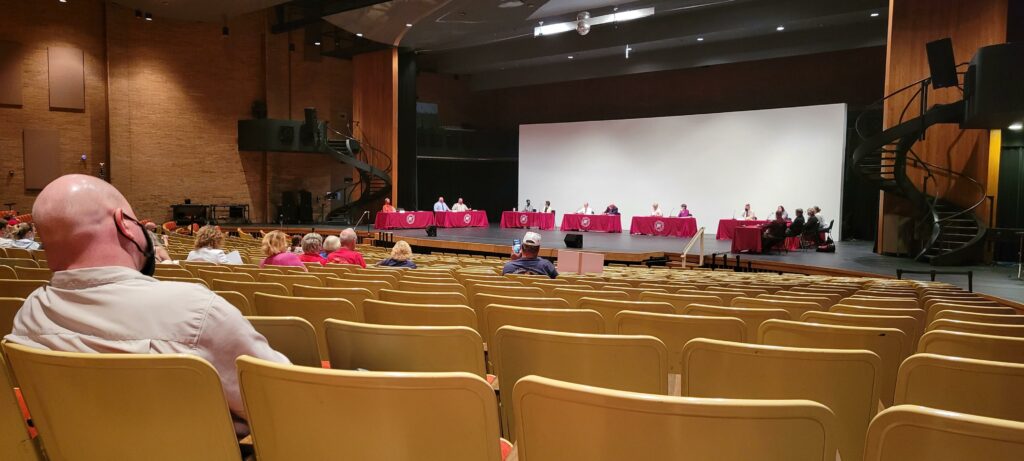
Restrictions and regulations during school board meetings are meant to inspire order and decorum, however, one board member is questioning the implications of some restrictions to the public’s freedom of speech during public comment.
Williamsport Area School District’s Policy 903 dictates who is able to speak during a public meeting. The policy states that only residents and taxpayers in the district may speak during the board meeting’s allotted public comment segment.
If enforced, according to school board member Adam Welteroth, this would exclude parents or guardians who live outside the district but still wish to speak on behalf of their children. He referred to these individuals as “stakeholders” and said they should be included in the policy.
“I fear when reviewing this policy, we may look at this policy through eyes of narrow and short-sided vision,” said board member Adam Welteroth during the district’s Tuesday evening meeting. “We as a district are a flagship of education and proper governance to other districts and government entities around Lycoming County and beyond because of our size and geographical location.”
Welteroth raised the motion to place a discussion of the policy on the board’s Oct. 5 meeting agenda. The discussion would address allowing “stakeholders” to be able speak to the board in addition to taxpayers and property owners.
The section of the policy Welteroth said he wishes reviewed currently states:
“In order to permit fair and orderly expression of public comment, the Board shall provide an opportunity at each open meeting of the Board for residents and taxpayers to comment on matters of concern, official action or deliberation before the Board prior to official action by the Board.[7]”
“Stakeholders of our community should have the opportunity to voice their opinion to this board,” Welteroth said. “If we were to start enforcing our current policy as it stands or not to expand upon our current policy to include the allowance of stakeholders to speak at our public meetings, we would be limiting our employees who live outside the district, a parent (s) or grandparents of students who live outside the district, the parents of students from other districts who are educated or compete in athletics within our district (CTE students and student athletes on our swim team), and our alumni.”
The motion to place the policy for review at the Oct. 5 meeting was approved by the board in a 7-1 vote, with board member Barbara Reeves voting against. Star Poole was absent.
Board President Lori Baer, asked how the board would determine if an individual was a stakeholder in the district.
“We don’t want people who aren’t stakeholders to take time away from residents,” Baer said.
Williamsport’s school board meetings are no stranger to conflict, with many parents recently speaking out against the governor’s recent mask mandate in schools as a response to the rising COVID-19 cases and the surge of the delta variant.
Renewed interest in enforcing the policy would dissuade outside residents or activist groups from speaking during the meeting’s public comment period. However, it’s unclear how an individual’s residence would be verified.
“I’m concerned about opening the doors to anyone,” said board member Lisa Nible.
According to the policy, the board may require individuals to submit their request to speak in advance of the meeting. This request would include their address.
The policy is enforced as follows:
Those wishing to speak during the first public comments section must submit a formal request in writing to the Business Administrator no later than 9:00 a.m. on the day of the Board meeting. This gives people an opportunity to come to the District Service Center on Monday before the Board meeting to read the posted agenda.
The presiding officer may:
- Interrupt or terminate a participant’s statement when the statement is too lengthy, personally directed, abusive, obscene, or irrelevant.
- Request any individual to leave the meeting when that person does not observe reasonable decorum.
- Request the assistance of law enforcement officers to remove a disorderly person when his/her conduct interferes with the orderly progress of the meeting.
- Call a recess or adjourn to another time when the lack of public decorum interferes with the orderly conduct of the meeting.




